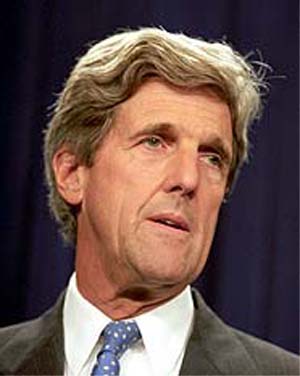
| By Admin1 (admin) (pool-151-196-35-236.balt.east.verizon.net - 151.196.35.236) on Tuesday, January 27, 2004 - 8:37 pm: Edit Post |
Peace Corps Supporter John Kerry wins New Hampshire Primary



| By steve scofield (lsanca2-ar29-4-62-160-024.lsanca2.dsl-verizon.net - 4.62.160.24) on Saturday, October 09, 2004 - 11:51 am: Edit Post |
--------------------------------------------------------------------------------
But there is news — real news — in Duelfer's 1,200-page report.
It tells the tale of how Saddam Hussein (news - web sites), clinging to power, enlisted top U.N. officials to help him bribe leaders of those European nations so dear to John Kerry (news - web sites)'s heart into ending tough economic sanctions against Iraq.
Whereupon Saddam planned to resume his decades-long quest for WMDs.
And he almost succeeded.
What stopped him?
The attacks of 9/11 — which prompted determined leaders like President Bush (news - web sites) and British Prime Minister Tony Blair (news - web sites) finally to confront the threat Saddam represented — as Duelfer's report confirms.
The key was the United Nations (news - web sites)' Oil-for-Food program — meant to provide relief for Saddam's suffering millions, but, in the event, one of the most corrupt "humanitarian" undertakings in history.
It provided almost no help to the Iraqi people, but rather gave Saddam nearly $11 billion in hard currency — cash used to bribe foreign officials into a gradual loosening of sanctions.
Secretary-General Kofi Annan (news - web sites)'s deputy, Benon Sevan, oversaw the program.
(Now it appears that Sevan may have enriched himself to the tune of $1.3 million, courtesy of oil companies he personally recommended to Iraq after the program began.)
Saddam's "evolving strategy," says Duelfer, "centered on breaking free of U.N. sanctions in order to liberate his economy from the economic stranglehold, so he could continue to pursue his political and personal objectives."
To do that, he resolved to divide the five permanent Security Council members. The United States and Great Britain were unapproachable — so instead he set about buying off the governments of France, China and Russia.
The three nations which — wouldn't you know? — worked at every turn to frustrate any attempt to hold Saddam's feet to the fire.
Among those to whom Saddam personally approved offers of oil vouchers — worth millions of dollars each — were:
* Charles Pasqua, a former French interior minister;
* Patrick Maugein, believed by Iraqi intelligence to be closely tied to French President Jacques Chirac; in addition, two of Chirac's aides and one of his spokesmen were given cash payoffs.
According to the report, an unnamed French politician wrote Saddam to assure him that France would use its veto power against any U.S. attack on Iraq.
* Officials in the Russian presidential office and foreign ministry.
In all, officials in more than a dozen countries were given the vouchers.
And dozens of oil companies in the same countries — their names still kept secret — got lucrative contracts.
Which were the nations with the highest percentage of oil-voucher recipients?
France, China and Russia.
The sweetheart deals "provided Saddam with a useful method of rewarding countries, organizations and individuals willing to cooperate with Iraq to subvert U.N. sanctions," according Duelfer.
In fact, Duelfer told the Senate Armed Services Committee (news - web sites) Tuesday, "sanctions were in free fall . . . If not for 9/11, I don't think they would exist today."
Once the sanctions were gone, said Duelfer, Saddam could have had a biological weapons "within a few weeks."
"What is clear is that Saddam retained his notions of use of force" and "had experiences that demonstrated the utility of WMD," said Duelfer. (This, after all, was a man who'd already used poison gas against both Iranian soldiers and Kurdish women and children.)
Also clear, according to the report, is that "Saddam never abandoned his intentions to resume a chemical weapons effort when sanctions were lifted and conditions were judged favorable."
You certainly won't be hearing anything like that from the John-John Ticket — Kerry and Edwards.
The Democratic Duo has adopted the simplistic position that no weapons of mass destruction means no justification for the Iraq war. And that the enlistment of "allies" — France? Russia? — is the key to a secure America.
Back in the real world, while the Duelfer report may not be a smoking gun in the case against Saddam, it certainly represents a loaded pistol pointed straight at the United States and at the global economy — dependant as it is on Mideast oil.
Saddam fully expected sanctions to disappear — and he acted accordingly.
According to Duelfer's report, the Oil-for-Food program and Saddam's decision to once again kick out U.N. inspectors in 1998 "spurred a period of increased activity in [weapons] delivery-systems development. The pace of ongoing missile programs accelerated, and the regime authorized its scientists to design missiles with ranges in excess of 150 km."
Duelfer's investigators also "uncovered Iraqi plans or designs for three long-range ballistic missiles with ranges from 400 to 1,000 km and for a 1,000-km-range cruiser missile."
These plans, they said, "demonstrate Saddam's . . . desire — up to the beginning of Operation Iraqi Freedom — for a long-range delivery capability."
Moreover, Saddam had the help of a host of scientists and technicians from Russia, and "had entered into negotiations with North Korean and Russian entities for more capable missile systems."
In fact, a French arms firm was in negotiations to supply Saddam with critical surface-to-air missile and other high-tech parts "with battlefield applications" just three weeks before the beginning of Operation Iraqi Freedom.
Duelfer's report makes it unmistakably clear that regional domination was Saddam's goal all along — and that he would have continued his quest once U.N. sanctions were lifted.
Which, thanks to the corruption at Turtle Bay, they would have been by now.
In retrospect, how can anyone doubt that Saddam represented a grave threat to the Middle East and the entire world?
That's exactly how Charles Duelfer describes him.
Waiting for U.N. "sanctions" to do the job — as John Kerry and John Edwards (news - web sites) now say they favored — would have been foolish.
The lesson of 9/11 is that America can't let the next threat grow until it's too late to do anything about it.
President Bush understands — which is why he was right to move militarily against Iraq.
To do otherwise would have been to invite another 9/11 — or worse.